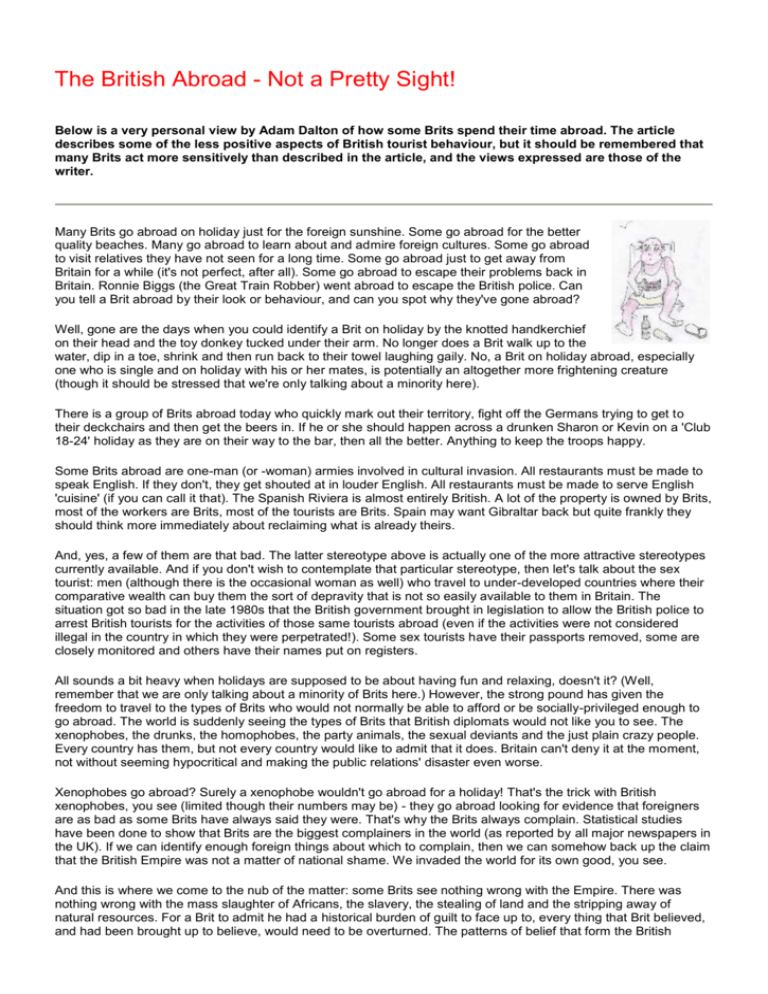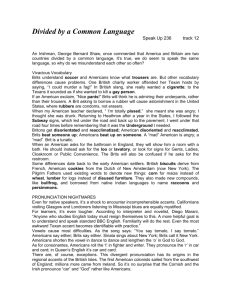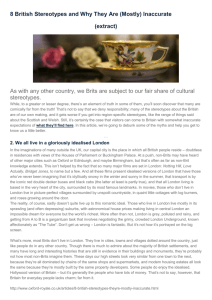The British Abroad - Not a Pretty Sight
advertisement

The British Abroad - Not a Pretty Sight! Below is a very personal view by Adam Dalton of how some Brits spend their time abroad. The article describes some of the less positive aspects of British tourist behaviour, but it should be remembered that many Brits act more sensitively than described in the article, and the views expressed are those of the writer. Many Brits go abroad on holiday just for the foreign sunshine. Some go abroad for the better quality beaches. Many go abroad to learn about and admire foreign cultures. Some go abroad to visit relatives they have not seen for a long time. Some go abroad just to get away from Britain for a while (it's not perfect, after all). Some go abroad to escape their problems back in Britain. Ronnie Biggs (the Great Train Robber) went abroad to escape the British police. Can you tell a Brit abroad by their look or behaviour, and can you spot why they've gone abroad? Well, gone are the days when you could identify a Brit on holiday by the knotted handkerchief on their head and the toy donkey tucked under their arm. No longer does a Brit walk up to the water, dip in a toe, shrink and then run back to their towel laughing gaily. No, a Brit on holiday abroad, especially one who is single and on holiday with his or her mates, is potentially an altogether more frightening creature (though it should be stressed that we're only talking about a minority here). There is a group of Brits abroad today who quickly mark out their territory, fight off the Germans trying to get to their deckchairs and then get the beers in. If he or she should happen across a drunken Sharon or Kevin on a 'Club 18-24' holiday as they are on their way to the bar, then all the better. Anything to keep the troops happy. Some Brits abroad are one-man (or -woman) armies involved in cultural invasion. All restaurants must be made to speak English. If they don't, they get shouted at in louder English. All restaurants must be made to serve English 'cuisine' (if you can call it that). The Spanish Riviera is almost entirely British. A lot of the property is owned by Brits, most of the workers are Brits, most of the tourists are Brits. Spain may want Gibraltar back but quite frankly they should think more immediately about reclaiming what is already theirs. And, yes, a few of them are that bad. The latter stereotype above is actually one of the more attractive stereotypes currently available. And if you don't wish to contemplate that particular stereotype, then let's talk about the sex tourist: men (although there is the occasional woman as well) who travel to under-developed countries where their comparative wealth can buy them the sort of depravity that is not so easily available to them in Britain. The situation got so bad in the late 1980s that the British government brought in legislation to allow the British police to arrest British tourists for the activities of those same tourists abroad (even if the activities were not considered illegal in the country in which they were perpetrated!). Some sex tourists have their passports removed, some are closely monitored and others have their names put on registers. All sounds a bit heavy when holidays are supposed to be about having fun and relaxing, doesn't it? (Well, remember that we are only talking about a minority of Brits here.) However, the strong pound has given the freedom to travel to the types of Brits who would not normally be able to afford or be socially-privileged enough to go abroad. The world is suddenly seeing the types of Brits that British diplomats would not like you to see. The xenophobes, the drunks, the homophobes, the party animals, the sexual deviants and the just plain crazy people. Every country has them, but not every country would like to admit that it does. Britain can't deny it at the moment, not without seeming hypocritical and making the public relations' disaster even worse. Xenophobes go abroad? Surely a xenophobe wouldn't go abroad for a holiday! That's the trick with British xenophobes, you see (limited though their numbers may be) - they go abroad looking for evidence that foreigners are as bad as some Brits have always said they were. That's why the Brits always complain. Statistical studies have been done to show that Brits are the biggest complainers in the world (as reported by all major newspapers in the UK). If we can identify enough foreign things about which to complain, then we can somehow back up the claim that the British Empire was not a matter of national shame. We invaded the world for its own good, you see. And this is where we come to the nub of the matter: some Brits see nothing wrong with the Empire. There was nothing wrong with the mass slaughter of Africans, the slavery, the stealing of land and the stripping away of natural resources. For a Brit to admit he had a historical burden of guilt to face up to, every thing that Brit believed, and had been brought up to believe, would need to be overturned. The patterns of belief that form the British cultural identity would be destroyed and cultural schizophrenia would set in. No, some Brits are in denial and wish to carry on as they have always done. If the world does not allow them to do so, then the crisis that would occur would be more dreadful than putting up with a few aggressive Brits in football shirts on holiday. When you meet a Brit on holiday, therefore, pity him and smile at him. He is a man who does not know himself, and has a self-doubt more deep-seated than any other in the world. Morally, though, the Brits should perhaps be stopped and forced to face up to a few home truths. Why hasn't this happened yet? The problem, of course, is money. Can the world afford to stop Brits going on holiday, when so many companies, jobs and national economies depend on the revenue generated by Brits going abroad on holiday? Companies and airlines in the UK also depend on Brits going abroad. There is even an airline waiting list for the lucrative airline routes to popular holiday destinations. For example, the British Midlands airline company was happy to fly to Warsaw until richer routes to Spain suddenly became available in 1999. Then, the less profitable Warsaw route was cancelled and the released planes were put on the Spanish routes. There are many self-interested but powerful voices that will always shout for the Brits to be allowed to go on holiday and to enjoy their full imperialist rights. And what happened to that cute donkey under the arm I mentioned at the start? Well, the Brits used to enjoy donkey rides along the beach, until the ridiculous and excessive demand for donkey rides led to tired donkeys on Spanish beaches being effectively mistreated. (Yes, even animals were beginning to suffer so that the British tourist's every childish whim might be fulfilled.) Brits like to think of themselves as animal lovers, so something had to be done about those foreigners being so cruel to animals. A national newspaper launched a campaign to save donkeys from such foreign mistreatment. The campaign was a triumph! But what agenda did the campaign really serve? Was it really just about protecting donkeys? Well, with the campaign, the Brits allowed themselves to think that they were morally responsible; and that they were morally superior to the animal-hating foreigners; and that some degree of cultural xenophobia was therefore justified; and that any past xenophobia was once more proven justified; and that Brits need to go into other countries for the good of those countries; and that Brits were right to go into countries in the past; and that the Empire was justified; and that Brits are superior and should have more rights than everyone else. And the truth in all this? The rich irony all along was that it was whimsical and unreasonable British demands that directly led to the poor working conditions of the donkeys in the first place. The Brits were trying to recreate the Victorian donkey rides of British holidays past, the holidays of Britain's golden era that were only economically viable because the Empire greedily drained the resources of its dominions. Such holidays can no longer be sustained, and neither can the wasteful Empire. And the Brits are only reluctantly prepared to face up to such a truth if they are permitted to do so with a clear moral conscience and a public affirmation of their superiority in the world. Fair trade, I suppose. And the donkeys? Well, the real donkeys were replaced by stuffed, cuddly donkey souvenirs. 'Souvenir': the French verb 'to remember'. The souvenirs are bought to remember the golden holidays and golden beaches of Britain's golden era, an era that should never be forgotten and should be affirmed forever more. Or at least until the end of the summer, when all holiday romances come to an end. Here endeth the travelogue, just one more popular genre and hangover of that golden Victorian era past. Discussion Questions 1. Does this description of the British abroad match up to: o your experience? o your expectations? 2. Where have your ideas about holiday makers come from? (e.g. novels, films, language learning textbooks, TV, personal experience, etc.) 3. How does the description of the British abroad compare with how Polish people behave abroad?






